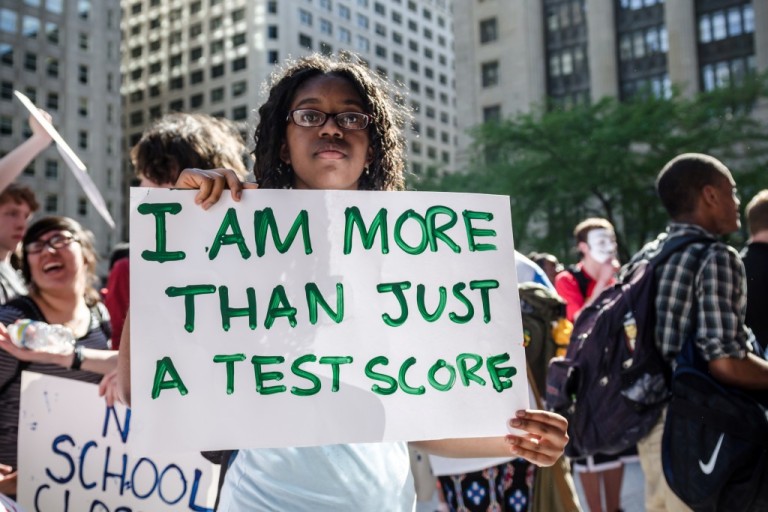Updated: February 9, 2024
What is “opting out”?
It means refusing to take a standardized test such as MCAS.

Why should I opt my student out?
To protect your child: For many students, the Big Test can be very stressful.
To improve education for all students: Opting out is an effective way to protest the overuse and misuse of standardized tests, which forces schools to focus on the demands of the tests instead of the needs of students. Test obsession eats up classroom time, narrows curriculum, destroys children’s love of learning, and fuels the school-to-prison pipeline.
To resist racist policies: Dr. Ibram X. Kendi, author of the book How to Be an Antiracist, says, “Standardized tests have become the most effective racist weapon ever devised to objectively degrade Black minds and legally exclude their bodies.” The Board of Elementary and Secondary Education’s outrageous August 2022 vote to increase MCAS passing scores is likely to harm black and brown students, students with disabilities and English learners the most.
To focus on learning and recovery: The time and resources required to test students this year would be better spent educating and supporting them, and there are better ways to gauge how students are doing.
How can I opt out my child?
Send the principal a letter saying you don’t want your child to take the test. For example:
“Dear —, I have asked my child, [name], not to take part in the [name the exam] this year. Please arrange for [them] to have a productive educational experience during the testing period.”
Many parents’ opt-out letters are honored, but just in case, you may also want to send your child to school (if they are learning in person) with a note to read to the test proctor, something like this: “My parent told me not to take this test.”
Is opting out legal?
Yes. State law says the Department of Elementary and Secondary Education must give tests to all students. But state law does not say every student must take those tests and it does not provide for any penalties to students who refuse, or their parents, except that students must pass the 10th grade tests to get diplomas.
What will my child do while the tests are administered?
State officials have told schools that if a student refuses the test, they should be allowed to read or do homework. Dover-Sherborn schools have made it easy and stress free to opt out in grades 3-8 with a simple email. Students can go to the library or do work on the computer, read, during MCAS with no questions asked. The Somerville Public School website includes basic instructions for parents who choose to opt out.
Will opting out affect my child’s academic standing?
Passing the state high school tests is a requirement for a high school diploma. But there is no state penalty for students who opt out in grades 3 – 8. Some schools use the scores to choose students for advanced work, but most do not. Check whether your school does. Email lesstestingmorelearning@gmail.com if you have questions.
Will opting out cause my student’s school to lose federal or state funding?
No. Parents have been told this, but it has never happened and there is no reason to think it will. The federal government has never required financial penalties. New York State has had at least 20% of its students opting out for several years, and despite some federal bluster, no New York school lost any money. Massachusetts officials have never said they would cut district or school funding.
Will my school be hurt in other ways?
A school’s state rating can be affected if participation of any subgroup of students, such as a racial subgroup, drops below 95 percent. But no school has ever suffered state takeover or intervention because of low participation, and there is no state law that would permit such action based on low participation alone. The bottom line is that being classified “in need of focused/targeted support” due to low participation rates may be unpleasant, but the label in itself carries few, if any, practical consequences.
How can I make my action have real impact?
One parent quietly opting out will not stop high-stakes testing. It’s important to join with other parents and let people know what you are doing and why. This creates more political power and also makes it less likely that individual families or students will be criticized. Tell your newspaper, parent organizations, school committee, and legislators. Use parent email networks. Reach out to Citizens for Public Schools at lesstestingmorelearning@gmail.com to let us know what your plans are, and if you would like our support.
Click here for a downloadable version of this fact sheet.
Citizensforpublicschools.org links to more materials about opting out and the Less Testing, More Learning campaign. Please keep us informed of what you are doing. Email lesstestingmorelearning@gmail.com. We will not release any information without permission.

